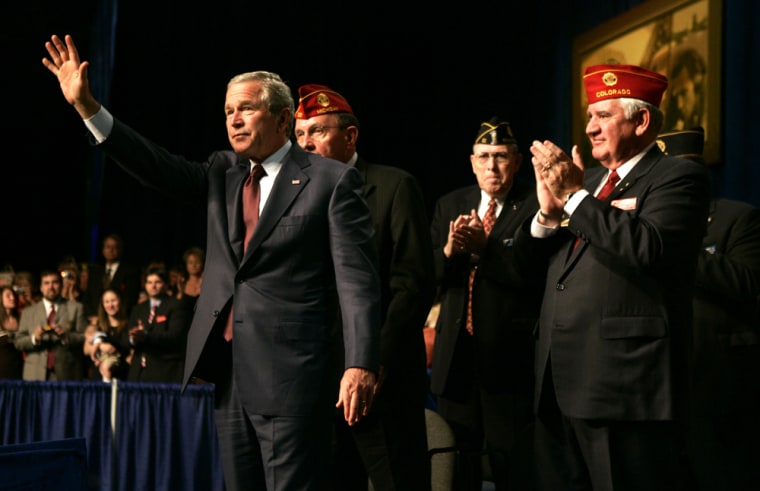President Bush on Thursday predicted victory in the war on terror at a time of increasing public anxiety at home, likening the struggle against Islamic fundamentalism with the fight against Nazis and communists.
With just over two months until Election Day, Bush said opponents of the war in Iraq who are calling for a plan to bring home troops would create a disaster in the Middle East.
"Many of these folks are sincere and they're patriotic but they could be -- they could not be more wrong," the president said. "If America were to pull out before Iraq could defend itself, the consequences would be absolutely predictable, and absolutely disastrous. We would be handing Iraq over to our worst enemies -- Saddam's former henchmen, armed groups with ties to Iran, and al-Qaida terrorists from all over the world who would suddenly have a base of operations far more valuable than Afghanistan under the Taliban."
The first in a series of war remarks
The president chose a friendly audience in one of America's most conservative states to begin his pre-election series of speeches defending his war strategy. The three-week campaign is tied to the fifth anniversary of the Sept. 11 terror attacks.
"The war we fight today is more than a military conflict," Bush told thousands of veterans at the American Legion convention. "It is the decisive ideological struggle of the 21st century."
American support
Only a third of Americans saying they approve of Bush's handling of the war or his leadership overall -- a figure that worries Republicans who are hoping they have enough support to keep control of Congress in elections just over two months away.
A majority of Americans approved of the way Bush responded to the Sept. 11 attacks nearly five years ago, according to an AP-Ipsos poll that came out Thursday, and the president was trying to remind them of that as the anniversary approaches.
Iraq-9/11 connection?
Bush described the current violence in the Middle East and the recently thwarted attack to blow up planes over the Atlantic Ocean as part of the same movement that resulted in the Sept. 11 attacks.
"As veterans you have seen this kind of enemy before," Bush said. "They are successors to fascists, to Nazis, to communists and other totalitarians of the 20th century. And history shows what the outcome will be.
"This war will be difficult. This war will be long. And this war will end in the defeat of the terrorists," Bush said.
He acknowledged the unsettling times -- marked by sectarian violence in Iraq, war along the Israel-Lebanon border and terrorists allegedly plotting to blow up planes between Britain and the United States.
"The images that come back from the front lines are striking and sometimes unsettling," Bush conceded. "When you see innocent civilians ripped apart by suicide bombs or families buried inside their homes, the world can seem engulfed in purposeless violence."
But he also said that those responsible for bringing down the World Trade Center are united with car bombers in Baghdad, Hezbollah militants who shoot rockets into Israel and terrorists who wanted to bring down the flights between Britain and the United States.
"Despite their differences, these groups form the outline of a single movement, a worldwide network of radicals that use terror to kill those who stand in the way of their totalitarian ideology," he said. "And the unifying feature of this movement, the link that spans sectarian divisions and local grievances, is the rigid conviction that free societies are a threat to their twisted view of Islam."
Demonstrators and counter-demonstrators
Even in Utah -- which gave Bush a wider margin of victory than any other state in the 2004 election -- the president's appearance was a source of dispute. Salt Lake City Mayor Rocky Anderson, a Democrat, led thousands of anti-Bush demonstrators on a march through the city Wednesday. He called Bush a "dishonest, warmongering, human-rights-violating president."
The White House countered by organizing a campaign-like rally at the airport for Bush's arrival Wednesday night. A couple thousand cheering supporters, who got tickets from the governor's office and the congressional delegation, stood under flood lights and cheered as Bush pledged to stay in Iraq.
The pro-Bush American Legion did not have any anti-war speakers or nationally prominent Democrats scheduled to speak at its convention, which attracted at least 12,000 veterans. Secretary of State Condoleezza Rice and Defense Secretary Donald H. Rumsfeld addressed the group earlier this week as part of the high-powered campaign to build support for the war.
This is the third time in less than a year that Bush has made a series of speeches on Iraq and terrorism. This time, it's an all-hands-on-deck effort, with Vice President Dick Cheney, Rice and Rumsfeld also touting the mission this week.
While in Salt Lake City, Bush had a half-hour private meeting with leaders of the Church of Jesus Christ of Latter-day Saints. He also planned to speak at a luncheon fundraiser for Republican Sen. Orrin Hatch.
